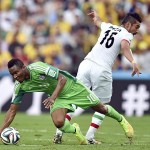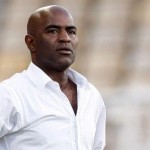The Washington Post
SAO PAULO, Brazil — There was a slight breeze on an otherwise warm afternoon and just beyond the giant black and white murals of Brazilian soccer legends was a colorful skyline, featuring apartment buildings, lime, peach and sky blue. A trio of players — including an American and a German — bounced a ball back and forth, until the entire team huddled together to begin practice. Back home, the sport has overtaken traditional pastimes such as wrestling and weightlifting in popularity.
“They have unbelievable talent,” a former coach said. “I can really only compare it to Brazil. Kids are playing on the streets, people are passionate about the game. It is their lives. They live with it every day.”
Only this group isn’t Brazilian. In fact, Iran’s national team is uniformly regarded as one of the worst in this World Cup. It has little funding and even less stability. Many oddsmakers slapped Iran with the longest odds of any of the 32 teams in the tournament, as high as 1,500-to-1 — on par with or a hair worse than Costa Rica and Honduras.
It’s a ragtag bunch featuring a Portuguese head coach and an American assistant, goalkeeping coach Dan Gaspar. Fourteen of the 23 players play in Iran, while others come from leagues in Kuwait and Qatar, as well as two from the English Premier League and one from Major League Soccer.
Iran was once anointed a charter member of the “Axis of Evil” by President George W. Bush, but on the pitch, international politics are checked at the door. As are egos.
Despite its long list of woes, Iran enters today’s showdown against a powerful Argentine team with a point in hand, tied for second in Group F despite an opening match that brought rounds of jeers from the stands. Iran tied Nigeria, 0-0, on Monday, relying on a conservative strategy that packs players on the defensive end and barely acknowledges the goal on the opposite end. Iran had just three shots on goal in the game.
“We’re known for our defending,” said defender Steven Beitashour, who was born in San Jose to Iranian parents and plays professionally with Vancouver of MLS. “We might not have 20 chances like some other teams. We might just have three, four, five chances.”
It’s a strategy for the desperate, but Iranian players and coaches make no illusions about who they are. They’re the top-ranked Asian team in the World Cup field (No. 43 in the latest FIFA rankings) and lost only twice in their qualifying run. They don’t allow many chances but they don’t take many either.
“You have to judge our players not as players from Liverpool, Real Madrid, Chelsea, Barcelona or Corinthians,” Iran Coach Carlos Queiroz said, “but as players that play in an amateur league.”
Queiroz’s is the biggest name on the roster. He had stints on the coaching staff at Manchester United and Real Madrid and was once considered a contender to lead the U.S. men’s team. Iran is the third team the 61-year old Queiroz has brought to the World Cup, but this experience has been markedly different than coaching South Africa (2002) or Portugal (2010). Even before Iran takes the field Saturday against Argentina, Queiroz has already decided he’ll be coaching somewhere else four years from now.
“They don’t have enough governmental support,” he told the Portuguese newspaper Publico this week, “and, it seems clear to me, they’ll stop having effective interest, because of a lack of finances, in maintaining the work done at the national team level.”

BRAZIL MAP: 2014 World Cup venues (Laris Karklis/The Washington Post;The Washington Post/Source: FIFA, ESPN)
Funding has been a constant source of frustration, and the federation says it has been unable to collect money from foreign-based sponsors due to international sanctions. Those sanctions have also forced the soccer team to compete in a bubble of sorts, as it has been unable to schedule quality international competition in recent years and become isolated from much of the soccer world.
The team had to cancel a training camp in Portugal before the tournament, plus a friendly match against Ghana, because of budget constraints. Media reports before the tournament suggested the team ordered cut-rate uniforms, instructing players to wash them in cold water to avoid shrinking and, in a break from tradition, to refrain from exchanging tops with opposing players. Team officials deny this, however.
Regardless, the list of needs is long: a better domestic league, proper pitches, better facilities, qualified coaches and, in every area, more money.
Resources have apparently not kept pace with a growing passion back home. This is only Iran’s fourth World Cup. It has managed just one win in 10 games on the sport’s biggest stage — memorably topping the U.S. team, 2-1, in 1998. In Tehran, the celebration spilled over into the streets when Iran formally qualified for this World Cup, and thousands of fans are traveling with the team in Brazil.
“I don’t believe this will change football in Iran, in general,” Namazi said. “In order for it to change, they need to really invest in infrastructure, youth academies, coaches, training, educating the fans, new stadiums, new pitches. There’s a lot that needs to be done.”


